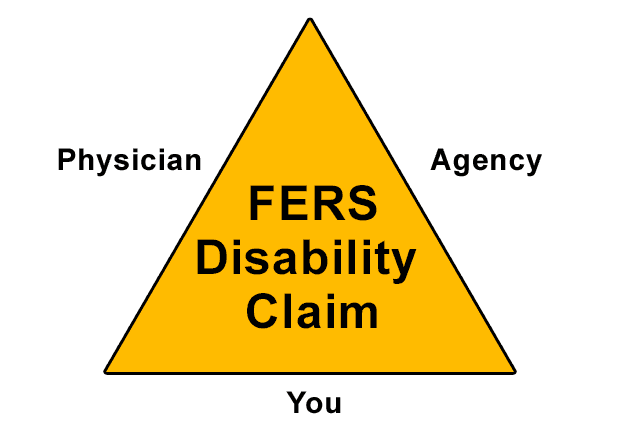As you may have guessed, form SF3112B: Supervisor’s Statement is completed by your supervisor, manager, or group leader. Your supervisor’s affidavit is a critical component of your application for FERS Disability Retirement (FDR).
This article discusses the role of SF 3112B and provides some important tips to help you identify issues with this form that could delay or prevent you from getting your FDR benefits.
As a first step, let’s take a look at how SF 3112B fits into the big picture.
Overview
As mentioned in a previous article, it can be helpful to think of your disability claim as a triangle:
One side of the triangle is the statement prepared by your physician (i.e., SF 3112C). Another side is the statement prepared by your agency (i.e., SF 3112B, SF 3112D, and SF 3112E). And the remaining side is your personal statement of disability (SF 3112A).
Ideally, all three statements should be consistent and should provide clear evidence of your eligibility for FDR benefits.
What is the Role of SF 3112B?
SF 3112B provides OPM vital information about your performance, attendance, and conduct. Specifically, OPM requires your supervisor to verify that your performance, attendance, and/or conduct have degraded significantly since the onset of your medical conditions.
To illustrate the importance of SF 3112B, let’s assume that both you and your physician provide strong statements (and evidence) to support your disability claim. If your supervisor also provides compelling evidence that you have a service deficiency (in performance, attendance, and/or conduct), then all three statements are basically in agreement, and your claim is strong.
If, on the other hand, your supervisor states (or implies) that your performance, attendance, and conduct are all satisfactory (or better), this creates a major discrepancy between his/her statement and the statements provided by you and your physician.
In other words, you and your physician are telling OPM that you are medically unable to work, yet your supervisor is telling OPM that there is no documented service deficiency and that you are meeting or exceeding your performance standards.
Such a blatant discrepancy could ultimately cause your claim to be denied.
Important Tips
To avoid the situation described above, it is imperative for your supervisor to complete SF 3112B accurately and thoroughly.
Specifically:
- If your performance is suffering, your supervisor should provide a list and/or discussion of all essential job functions that you are unable to perform effectively, efficiently, and/or consistently.
- If your attendance is suffering, your supervisor should provide the date on which your attendance became unacceptable and an accurate tally of your leave hours, including sick, annual, LWOP, AWOL, and FMLA.
- If your conduct is unacceptable, your supervisor should identify the approximate date on which your conduct became unacceptable and provide a detailed narrative of specific incidents and general behaviors that are incompatible with your position description.
- Your supervisor should also provide a detailed description of any efforts that the agency has made to accommodate one or more of your disabling medical conditions, especially any failed accommodation attempts.
Summary
Review SF 3112B with a fine-tooth comb and bring to your supervisor’s attention any errors, inaccuracies, or omissions you identify. You want your supervisor to provide OPM a clear and accurate account of your work-related deficiencies (i.e., performance, attendance, and/or conduct).
Note: SF 3112B can be found on pages 4 and 5 of SF 3112: Documentation in Support of Disability Retirement Application.



